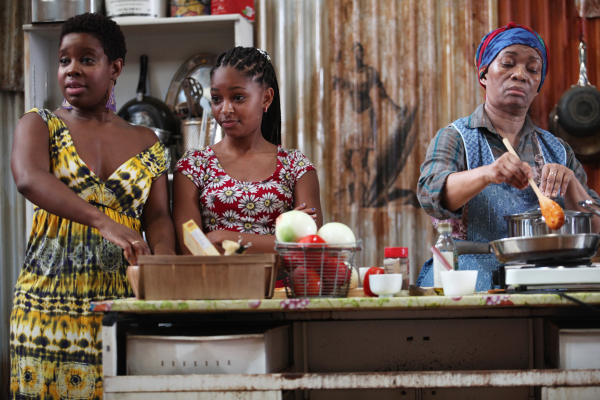generations

(© Julieta Cervantes)
Something is simmering at Soho Rep. Is it the barely restrained energy of a South-African family in flux? Or is it merely the aromatic food that is prepared in the onstage kitchen throughout the performance? In this U.S. premiere of debbie tucker green's generations (copresented by The Play Company), the answer is, to varying degrees, both. Whatever your takeaway from this sumptuous and thematically furtive play, all are likely to agree: This is the best-smelling show in town.
You might not suspect that upon first entering the space. Scenic designer Arnulfo Maldonado has transformed Soho Rep. into a giant tin shack in South Africa. Multicolored wavy metallic panels cover the walls. The theater floor is covered in reddish dirt. An island kitchen dominates the center of the space, where a large pot gently steams on a hot plate. The pleasant aroma of onions wafts over the room, drawing us into the story.
Three generations of a black South-African family enter the space and the women immediately set about preparing a meal. Mama (Ntombikhona Dlamini) and Grandma (Thuli Dumakude) take the lead. Grandad (Jonathan Peck) and Dad (Michael Rogers) mostly stand to the side and look amused. "A well fed woman. That's my wife," Dad teases. Everybody laughs. Meanwhile, a handsome young Boyfriend (Mamoudou Athie) aggressively courts Girlfriend (Shyko Amos). Junior Sister (Khail Toi Bryant) thinks it will never work out, though, because Girlfriend can't cook.
Appropriate to the setting, much of their talk revolves around cooking…or does it? In a line spoken in many variations, Grandma says to Mama, "I was the cooker — you was the cookless — I was the cooker who coached the cookless…I coached you to cook…You were a bad learner." Green (whose born bad was produced by Soho Rep. in 2010) uses the type of opaquely poetic language that has become fashionable on the European stage. While many will undoubtedly find the lack of forthrightness and seeming redundancies in the text frustrating, few will walk away thinking that the characters are only just talking about cooking, especially since so many of them disappear over the course of the play, leaving the survivors to weep and repeat themselves. Perhaps this is what subtext looks like in the 21st century.
The disappearances (or deaths) are facilitated by a 13-person choir positioned strategically around the perimeter of the room. These talented and powerful singers read out the names of the dead and sing the characters offstage with mournful dirges. The surround-sound effect of this immersive choir is quite breathtaking, especially under the skilled leadership of Bongi Duma (The Lion King) who has created original compositions for this play.
Still, for all its visual and aural opulence, director Leah C. Gardiner's production is deficient in the basics. The audience is seated in benches, chairs, and stools of all models and makes. They're arranged in such a way that one chair faces directly into the back of another, rather than in a staggered formation. Gardiner stages the play as if her audience were raked, keeping far too much of the blocking below the waist. This means that if you are unfortunate enough to be sitting in the back behind tall people, you'll probably miss a fair amount of the action.
No matter what you gather from the story, however, you'll probably walk away from this play feeling hungry. All the talk about cooking and the smell of delicious food hovering in the air serves as a powerful aperitif. Luckily, most show times are 7:30pm and the play is only 30 minutes long, so when you get out you'll be just in time for dinner.











